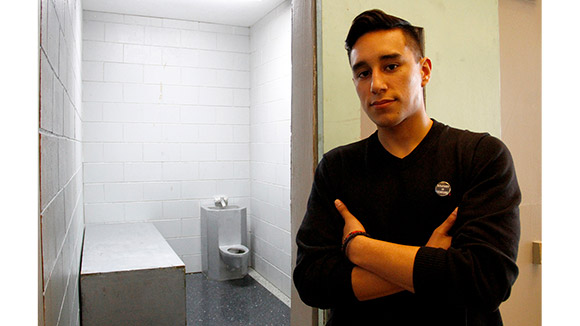
Solitary confinement has become a critical issue in criminal justice reform, and this April, John Jay College, in partnership with The Center on Media, Crime and Justice, Public Square Media and National Religious Campaign Against Torture (NRCAT), hosted Solitary Confinement Week, a weeklong series of events designed to educate journalists, advocates, John Jay community members and the general public on the adverse effects of prolonged isolation.
In addition to a symposium titled “Rethinking Solitary Confinement: Where Do We Go From Here?”, a walk-through, replica solitary cell was installed on John Jay’s campus, where participants learned about the negative mental and physical effects of being held in isolation for up to 23 hours a day in a tiny six-by-nine-foot cell. Participants also used virtual reality headsets to get a better understanding of the psychological damage caused by solitary confinement.
"This is really powerful,” said John Jay President Karol V. Mason, after going through the virtual experience. “There ought to be very, very limited circumstances where somebody is separated from the general population.”
“A lot of legislators write policy with people they never come in contact with. There is a big space between policy in theory and policy in practice, and in order to close that space, you need people who are directly impacted involved in teaching and learning.” —Johnny Perez, Director of the U.S. Prisons Program, NRCAT
Johnny Perez, Director of the U.S. Prisons Program with The National Religious Campaign Against Torture (NRCAT), has experienced solitary confinement firsthand and is now an advocate for the abolition of solitary confinement, a practice that he and NRCAT believe constitutes torture. He says that educating students on the realities of mass incarceration is important, especially for John Jay students who will become future criminal justice leaders.
“A lot of legislators write policy with people they never come in contact with,” Perez said. “There is a big space between policy in theory and policy in practice, and in order to close that space, you need people who are directly impacted involved in teaching and learning.”
President Karol V. Mason expressed admiration for Perez and the advocates who participated in the weeklong series who are working towards criminal justice reform. “Johnny Perez spent three years in solitary confinement, but he is still able to do this work and make sure other people don't have that experience,” she said. “There's so much talent locked up in our criminal justice system."

“Johnny Perez spent three years in solitary confinement, but he is still able to do this work and make sure other people don't have that experience. There's so much talent locked up in our criminal justice system." —President Karol V. Mason
On April 25, the John Jay Student Affairs Office, Public Square Media and NRCAT screened video stories from “RIKERS: An American Jail” and The Marshall Project’s “We Are Witnesses,” and featured panelists of experts and advocates. Bryant Silva, a graduating senior at John Jay College who interns at Public Square Media and helped organize Solitary Confinement Week, says that events like these allow students to understand the importance of criminal justice reform. “As a college for criminal justice, this is directly relevant to what we study,” Silva said. “People are getting informed, and they’re seeing that solitary confinement is unacceptable and a violation of our human rights.”
“Having a deep understanding of mass incarceration allows you to humanize the people who have been impacted by the system,” said Perez. “We’re not saying you shouldn’t hold people accountable—we’re saying you shouldn’t treat people inhumanely in the course of holding them accountable.”



